Dispel Hatred’s collateral damage
If your enemy is hungry, give him food to eat; if he is thirsty, give him water to drink. (Proverbs 25: 21); If your enemy is hungry, feed him; if he is thirsty, give him something to drink. (Romans 12:20)
War is evil. There’s no disputing that fact. But hateful rhetoric disguised as love can be just as sinister – perhaps even more so. Please allow me to explain.
There is no disputing the ugly and disheartening headlines that have been on constant feed since the Russian-Ukrainian War began. Russia invaded Ukraine without confrontation. The acts of violence that have left Ukrainians fleeing their homeland in fear for their lives are indefensible.
But what of the public shunning of everything Russian that has come thereafter? Have we lost all thoughts of reason and humanity in the aftermath? Has the world forgotten that there are innocents on both sides of the battlefield? Do we not give credence to the Russian citizens facing economic sanctions, the lost lives of untold thousands of Russian soldiers, and the brave Russian public who are unafraid of protesting the war at the potential cost of a 15-year prison sentence?
I must ask, how do discrimination, intolerance, and narrow-mindedness make oppression any less malevolent?
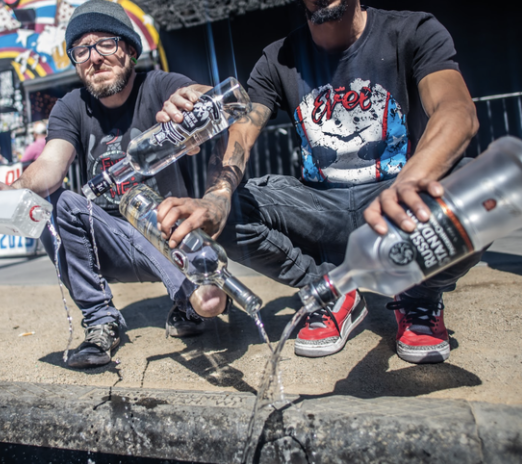
The first public reaction I heard of in protest of the war was the disposal of Russian vodka. Media outlets across the country showed liquor store owners proudly pouring out the perceived offensive liquid in a symbolic show of defiance against the eastern war machine.
Earlier last week, Russian gymnast Ivan Kuliak was denounced by the International Gymnastics Federation (FIG) for daring to wear the letter “Z” on his uniform. The Russian military has used the “Z” to mark their vehicles, so its usage is perceived to endorse the war. According to public sentiment, there can be no other application of this symbol – even when there is.
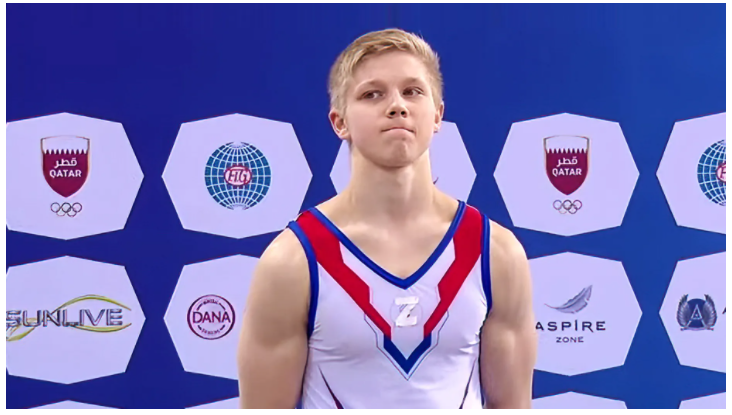
Prior to Kuliak’s performance, the FIG had ordered the removal of all Russian flag emblems from uniforms. Kuliak chose to display the “Z” in replacement of the same. This 20-year-old athlete is now facing disciplinary measures by the FIG for what they have deemed to be “shocking behavior.” The FIG subsequently banned all Russian and Belarusian athletes from further competitions. Isn’t their punishment of this young athlete and all others from his homeland even more “shocking” and outrageous?
In Kuliak’s case, he wore the symbol to stand in solidarity with his homeland – a fact that most media outlets and even the sporting world refuse to acknowledge.
“I saw it with our military and looked at what this symbol means. It turned out [it means], ‘for victory’ and ‘for peace,'” Kuliak explained. “I didn’t wish anything bad on anyone, I just showed [what] my position [was]. As an athlete, I will always fight for victory and stand for peace.”
The International Soccer group, FIFA, has also banned all Russian athletes from their competitions. The European Soccer group, UEFA, forbid Russians to participate in the 2022 World Cup. Even disabled athletes who dared to try to compete for Mother Russia have been banned from participating by the International Paralympic Committee. Their decision came as other athletes refused to play against the Russians and threatened to boycott the events if the eastern athletes were allowed to participate. How are these acts not deemed prejudicial?
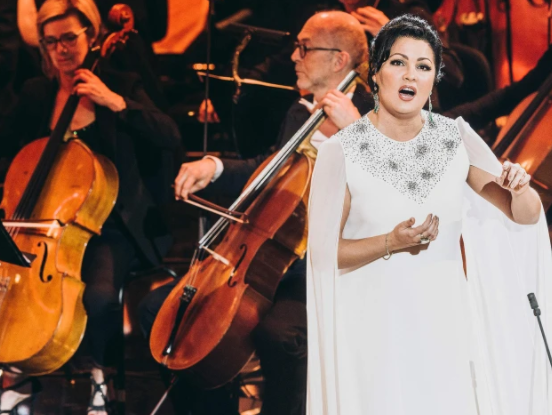
Photo courtesy of Christoph De Barry.
The sporting world is not alone in its attempts to punish all Russians. Artists have also faced the same inequitable treatment in an unsurprising yet equally frustrating manner. The New York Metropolitan Opera, for example, recently terminated its relationship with its most beloved, highest-grossing soprano, Anna Netrebko. Her crime? Netrebko refused to denounce Russian President Vladamir Putin when asked to do so by her employer.
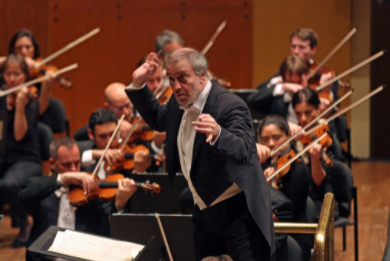
“It is a great artistic loss for the Met and for opera,” Met general manager Peter Gelb announced on March 3rd. “Anna is one of the greatest singers in Met history, but with Putin killing innocent victims in Ukraine, there was no way forward.”
Similarly, renowned Russian conductor, Valery Gergiev, was fired from both the Munich Philharmonic and the Rotterdam Philharmonic in the Netherlands for his refusal to denounce his long-time friend, Vladimir Putin. Apparently, remaining silent when asked for condemnation is enough to lose one’s livelihood.
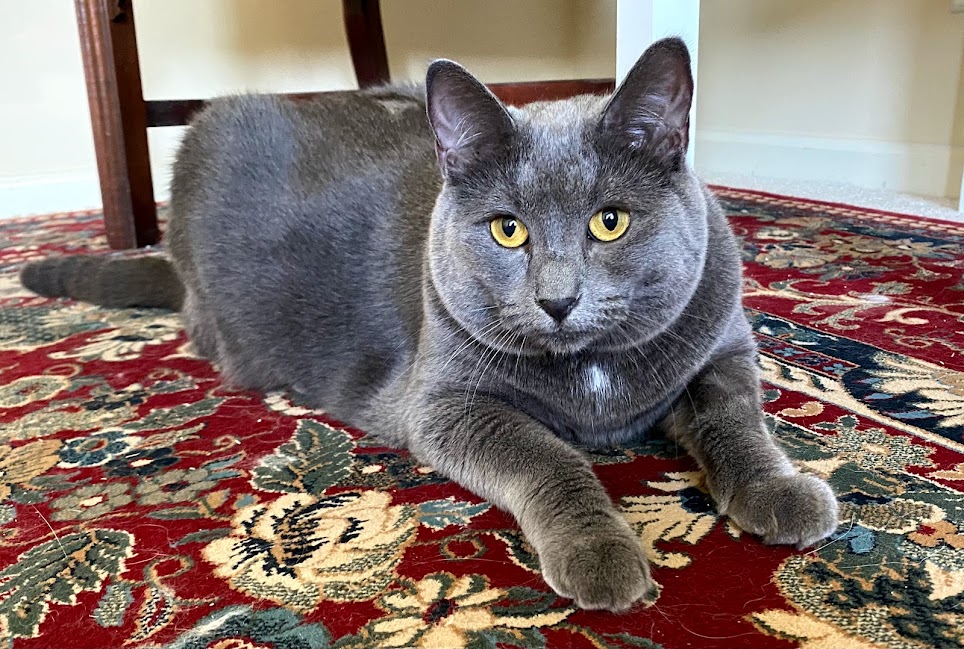
In the angry crescendo of warped justice, animals, too, aren’t immune from being blacklisted. Under the “that’s a bit too much” category of outrage, the Federation Internationale Feline announced that Russian-bred cats are now banned from competitions. Not satisfied with this action alone, the FIF will no longer allow Russian exhibitors to participate in their events.
Closer to home, I’m watching the ostracization of all things Russian in my own backyard with equal parts shock and sadness. History is potentially being rewritten before my very eyes in one such demonstration.
In June 2004, Sea Island, GA, hosted the G8 Summit. This annual event brings together the leaders from the top eight industrial nations to discuss economics, public health, human rights, and even nuclear proliferation. As is typical, Putin represented his nation in this event.
A large photo of that era’s world leaders walking in the sand is displayed in the lighthouse museum on St. Simon’s Island. The heads of state are all pictured with broad smiles on their faces. The conviviality captured in this photo always made me feel happy. Something extraordinary occurred in the Golden Isles during that gathering, and by all counts, everyone truly enjoyed their time here. Such events testify to all things good in the world as we work together to remain friends and promote peace.
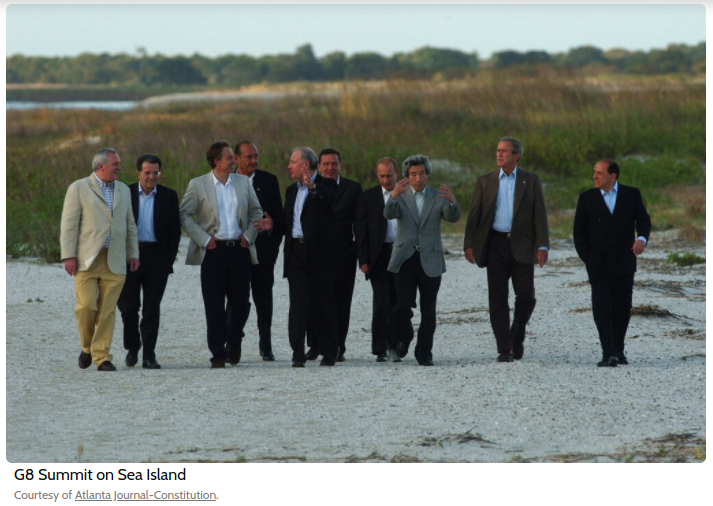
Since war broke out in Ukraine, the Sea Island Authority embraced public calls to remove the Russian flag from their G8 memorial. The lighthouse museum has also removed Putin’s name from the chair he sat in during the Summit. Public outcry is now pushing the organization to cover Putin’s face in the photo. I expect the portrait to ultimately be removed from their walls as a final act of appeasement – all under the guise of Ukrainian support.
Perhaps more than any of the above, the complete absence of calls for prayers for both Ukrainians and Russians may bother me the most. “Pray for Ukraine” has become an acceptable mantra. “Fly the Ukraine flag” is today’s fashionable battle cry.
But what of prayers for the Russians? What of sympathy for Russian-Americans living in all parts of the world, including on our little Sea Island? When attacking all things Russian, banning Russian athletes and other society standouts, are we not showing rampant discrimination against individuals who have done nothing wrong? Will demonstrating hatred against anything Russian help end the war, or is it, instead, teaching intolerance, illiberalism, and injustice? I fear acts of retribution and violence are soon to follow.
Alternately, aren’t we – especially Christians – to speak love to everyone, including those we may think of as our opponents? Absolutely! There is no higher calling than demonstrating love in the face of injustice, violence, and evil.
The Bible tells us as much in the scriptures I quote at the top of this blog. In both the Old and New Testaments, we are told to be kind to our enemies. If your enemy is hungry, give him food to eat; if he is thirsty, give him water to drink. (Proverbs 25: 21) If your enemy is hungry, feed him; if he is thirsty, give him something to drink. (Romans 12:20)
Is that easy to do? Never. Should we do so anyway? Absolutely.
Sabina Wormbrund was the wife of Richard Wurmbrand – a Romanian atheist turned Lutheran pastor who later established the Christian organization Voice of the Martyrs. Both Richard and Sabina were tortured under the German Nazi and Russian Communist regimes for their faith. Despite their brutal treatment, Sabina and Richard remained outspoken proponents of love and kindness, even to their persecutors. Sabina once said, “While others are bent on revenge, on ways of doing more evil than their neighbor, God gives the ability to return good for evil.” Who are we, now, to do any less?
And so, I caution those who would speak out in love to the Ukrainian people to do the same for the Russians. Canceling, discriminating, and shunning anyone is not only harming a civil society; it’s fomenting hatred in return. God told us to love one another. “Do not repay anyone evil for evil. Be careful to do what is right in the eyes of everyone.” (Romans 12: 17)
We cannot invoke hatred against anyone. The collateral damage of hatred is injustice evoked under a mantle of support for a preferred party. The only force that can overwhelm malevolence is love. As Romans 12:21 reminds us, “Do not be overcome by evil but overcome evil with good.”
May we all remember to love one another more deeply – that includes everyone on both sides of the battlefield, even in times of war.
#LoveOneAnother; #PrayforUkraine&Russia; PrayforPeace